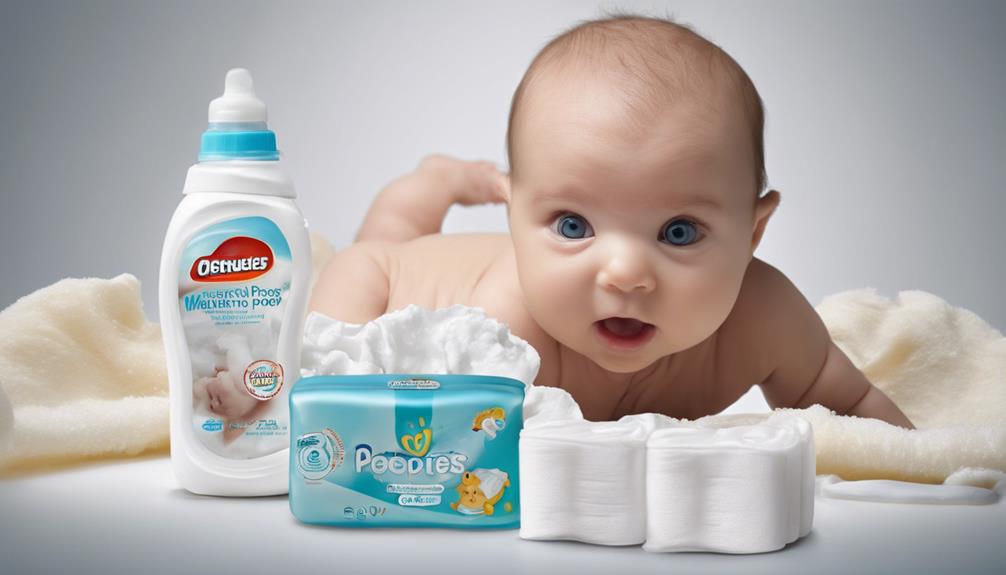Have you ever pondered whether a guaranteed method exists for maneuvering through the realm of newborn care? Indeed, regarding the nuances of taking care of a newborn, an abundance of knowledge is available.
But what truly sets apart a thorough guide on the subject? Let's explore the essential tips and strategies that can make a world of difference in ensuring the well-being of your little one.
Key Takeaways
- Establish feeding and sleep routines for newborn growth and well-being.
- Engage in bonding activities like skin-to-skin contact and gentle soothing techniques.
- Prioritize newborn safety by following safe sleep practices and maintaining a comfortable environment.
- Regular diaper changes and hygiene practices are crucial for newborn comfort and skin health.
Newborn Feeding Schedule
As new parents, we quickly learn that establishing a consistent newborn feeding schedule is important for their growth and well-being. Whether your little one is breastfed or formula-fed, understanding their hunger cues is essential. Breastfed newborns may exhibit signs like rooting or sucking on their hands, indicating they're ready to feed. On the other hand, formula-fed babies typically consume 1-2 ounces per feeding in the early days.
After each feeding session, remember to burp your newborn to release any swallowed air, which can help prevent discomfort. Regular feeding is vital to meet the high energy demands of their rapid growth. Newborns usually need to eat every 2-3 hours, totaling 8-12 feedings a day. This consistent feeding schedule guarantees that your baby receives the necessary nutrition to thrive and develop.
Diapering and Hygiene Tips
Maintaining your newborn's hygiene is essential for their comfort and health. Keeping your baby clean and dry not only prevents diaper rash but also fosters a sense of well-being. Here are some tips to help you navigate the world of diapering and hygiene:
- Regular Diaper Changes: Changing your newborn's diaper every 2-3 hours is vital in maintaining proper hygiene and preventing diaper rash. It guarantees that your baby stays comfortable and free from irritations.
- Proper Wiping Technique: When using baby wipes, remember to wipe from front to back to reduce the risk of infections. This simple step can help keep your baby's sensitive areas clean and healthy.
- Diaper Fit: Make sure the diaper fits snugly but not too tight. A well-fitted diaper prevents leaks and discomfort for your little one, allowing them to move freely and comfortably.
- Diaper-Free Time: Giving your baby some diaper-free time allows their delicate skin to breathe and helps prevent diaper-related issues. Letting your baby go without a diaper for short periods can promote healthy skin and reduce the likelihood of rashes.
Sleep Patterns and Routines
Guiding your newborn's sleep patterns and establishing routines can play a significant role in promoting their well-being and development. Newborns typically sleep for 16-17 hours a day in short periods of 2-4 hours at a time. By 3 months, many babies start sleeping through the night for 6-8 hours.
Ensuring consistent sleep routines can help regulate your baby's sleep patterns. Remember, if your baby isn't sleeping through the night by 3 months, there's usually no need to worry. However, if your little one is having persistent sleep issues, consult a pediatrician for professional guidance.
Understanding your baby's sleep needs and patterns can contribute to a smoother caregiving experience. Be patient and attentive to your baby's cues, and with time and a bit of effort, you can help them establish healthy sleep habits for their overall well-being.
Bonding and Soothing Techniques

Establishing a strong bond with your newborn through nurturing touch and soothing techniques is essential for their emotional well-being and development. Here are some techniques to help you enhance bonding and soothe your baby:
- Skin-to-skin contact: Promotes the release of oxytocin, strengthening the bond between you and your little one.
- Gentle stroking and cradling: Helps regulate your baby's heart rate and induces a sense of calm and relaxation.
- Massage techniques: Improve circulation, aid digestion, and reduce stress in your newborn, fostering overall well-being.
- Vocal sounds, music, and gentle movements: Soothe your baby, creating a secure environment and promoting emotional connection.
Safety Measures for Newborns
To make sure the safety of your newborn, it's important to follow recommended sleep practices that reduce the risk of SIDS and create a secure sleep environment.
Always remember to place newborns on their back to sleep, as suggested by the American Academy of Pediatrics, to lower the chances of SIDS. Opt for a firm mattress and use a fitted sheet in the crib to provide a safe sleeping surface. Avoid placing soft bedding, pillows, blankets, or toys in the crib to prevent suffocation hazards. Keep the baby's sleep area free from cords, wires, and any potential strangulation risks.
Additionally, maintain a comfortable room temperature between 68-72°F to prevent overheating during sleep. By adhering to these safe sleep practices, you can help guarantee your newborn's well-being and reduce the risk of sudden infant death syndrome.
Prioritizing safe sleeping habits is critical for newborn safety and care.
Frequently Asked Questions
What Are the Proper Ways to Take Care of a Newborn Infant?
Taking care of a newborn involves supporting the baby's head, ensuring a safe sleep surface, frequent diaper changes, and seeking medical advice when needed. We prioritize hygiene, safety, and communication with healthcare professionals for utmost care.
What Is a Routine Care for a Newborn?
Feeding every 2-3 hours, ensuring 16-17 hours of sleep, changing diapers regularly, bathing 2-3 times a week, and bonding activities like skin-to-skin contact are essential for routine care of a newborn.
What Are the 5 Steps of Newborn Care?
We care for our newborn by feeding every 2-3 hours, changing diapers frequently, bathing 2-3 times a week, soothing with swaddling and rocking, and ensuring safe sleep practices. These steps nurture and protect our little one.
What Are the Do's and Don'ts for a Newborn Baby?
We make sure to wash hands before holding the baby, strap them in securely, avoid loose bedding, and place them on their back to sleep. We don't rough play or jiggle the baby to keep them safe and sound.
Conclusion
As new parents, we grasp the importance of providing the best care for our newborns. By following the thorough guide on newborn care, we can guarantee their safety, health, and happiness.
Remember, seeking support from healthcare providers and maintaining routines are key in this journey.
Let's continue to learn, grow, and cherish every moment with our little ones. Together, we can give them the best start in life.









